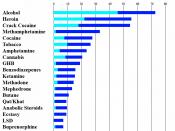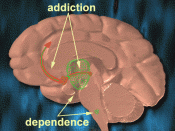The great nineteenth century advances of chemistry created the modern pharmaceutical industry. In 1897 aspirin was discovered which marked as the first ever 'wonder drug.' The new industry soon turned to the old botanical products which were already in wide use throughout the globe. These were reprocessed and highly refined for potent forms such as morphine, heroin and cocaine. They had huge effects on symptoms - especially the opiates for pains and were widely available in Europe as well as in the States. Soon their addictive qualities became public concern especially with the ever increasing use of these potent drugs.
The term addiction began infrequently to be used in the earlier part of the nineteenth century. Only in the last quarter of the nineteenth century, scientific vocabulary emerged and particularly in Britain the term 'inebriety' began to be utilised. At the onset of the present century the word addiction replaced the term 'inebriety' and began to be frequently used in the English language.
Addiction became an accepted medical and scientific term. It was also a concept that carried implications of evil and moral decay. Other related words such as 'dependence' are now the accepted terms scientifically, although addiction is still the term commonly used by the large majority of the public. In medical texts, addiction was still seen as a form of poisoning - 'acute poisoning.' It was also described as 'accidental or conscious overdosing' - 'chronic poisonings' or being dependent on opium or morphine. In the late 1960s the term addiction was used to describe a 'disease.' This was then replaced and modified to other terms such as 'dependence.' (Berridge, V. 1999, p-161 & 285)
The World Health Organization (1969) defines a drug as "Any substance that when taken into the living organism, may modify one or more of...



Informal
I believe that your essay would be much better with the use of formal language.
1 out of 2 people found this comment useful.